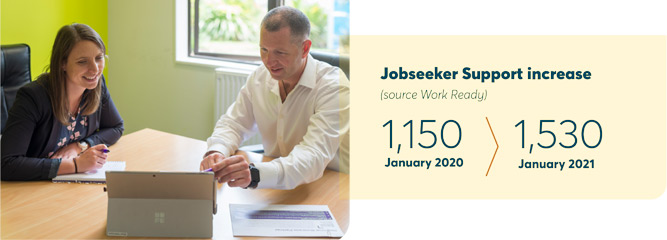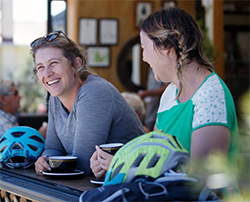COVID-19 has had a huge impact globally, nationally, and regionally. While Nelson has been fortunate to have experienced relatively few infections, the social and economic consequences have been, and will continue to be, considerable. These impacts are not over – many changes to how we live, work and travel will be with us for much longer.
Council is committed to supporting recovery and regeneration in Nelson. This focus is reflected throughout the Long Term Plan. We will continue to work in partnership with central government, neighbouring councils, iwi, community organisations, businesses and the wider community, to help regenerate Nelson for us all and to support community wellbeing.

Uncertainty for local businesses and employment
COVID-19 has brought significant uncertainty to the operating environment for local businesses. Changes to Alert Levels, border restrictions, and the global economic outlook has required businesses to be resilient and remain agile to constant change. The impact of COVID-19 on the regional economy has been highly variable depending on the sector and the business.
Since the easing of lockdown restrictions, some sectors, particularly the primary industries, reported stronger demand than pre-COVID-19. Other sectors reliant on international migrant access to New Zealand, either as tourists or seasonal labour, have been more severely impacted. Given Nelson’s high reliance on export markets, our industries are vulnerable to any global economic downturn that may eventuate.
The path and pace of economic recovery from here remains uncertain, depending on numerous factors such as the course of the virus, the distribution and effectiveness of vaccines, how quickly the global economy recovers, and any long lasting changes to production and consumer behaviour. While spending in the region rebounded post lockdown, it has remained lower than previous year levels since November 2020, due to a lack of international tourists in the region. Many economic indicators remain volatile and hard to predict. Spending patterns over the next few months will be critical to assess the real impact of border closures once the wage subsidy and domestic summer holiday effects are over.

The economic impact of COVID-19 has been disproportionate across our community. Those who were vulnerable pre-COVID-19 are at a greater risk of facing employment challenges.
In Nelson, the number of Jobseeker Support recipients increased from 1,150 in January 2020 to 1,530 in January 2021 (source: Ministry of Social Development). Numbers have recently dropped due to seasonal labour requirements over the summer and a lack of access to migrant labour. The labour market currently remains relatively tight, with those on the jobseeker benefit making up 4.6% of our working age population at the end of January 2021, compared to 3.5% at the same time last year (pre- COVID-19). Job seeker numbers are expected to lift again in autumn.
Housing unaffordability and availability has compounded the impact of COVID-19 across our region. There is a critical shortage of houses available for people in need, and dramatically
increasing house prices are putting home ownership out of reach for a growing proportion of our people. This challenge is also limiting our local businesses’ ability to grow and attract talent to our region.

 In 2020/21 Nelson City and Tasman District Councils increased funding to the Nelson Regional Development Agency (NRDA) from $1.2 million to $1.66 million to support delivery of the first year of Project Kōkiri, our region’s economic recovery plan. Project Kōkiri is a collaboration across NRDA, the two councils, iwi, the Chamber of Commerce, business and other relevant government agencies.
In 2020/21 Nelson City and Tasman District Councils increased funding to the Nelson Regional Development Agency (NRDA) from $1.2 million to $1.66 million to support delivery of the first year of Project Kōkiri, our region’s economic recovery plan. Project Kōkiri is a collaboration across NRDA, the two councils, iwi, the Chamber of Commerce, business and other relevant government agencies.
Nelson City Council provided funding of $250,000 alongside a $200,000 contribution from Tasman District Council and a range of central government assistance to allow delivery of Project Kōkiri. This funding delivered an expanded work programme to help businesses through the initial response to COVID-19, with a particular focus on those sectors hardest hit due to border closures. The NRDA worked with the Chamber of Commerce and businesses to deliver the ‘We’ve Got This’ campaign, and supported local procurement to provide as much cash-flow as possible to businesses in the region. The tourism sector was supported to shift towards a domestic visitor market. Find out more at projectkokiri.nz.
Council supports the Interim Regional Skills Leadership Group identifying better ways to meet future skills and workforce needs in our regions. Resolving constraints of seasonal labour challenges has been a key focus.
Council responded to the impact of COVID-19 by identifying ways to directly support our local businesses and people. While being mindful of the need to save where it can, Council is not retrenching and has proposed an increase to our capital works programme over the next ten years of $169 million. These capital projects are designed to deliver multiple benefits to the community, including the provision of local employment opportunities. Council has also streamlined procurement to allow faster approval of tenders to keep money circulating in the economy. The Jobs for Nature projects are also providing employment and training opportunities for those who may have lost their jobs due to COVID-19.
Council recognises that some residents have been harder hit by COVID-19 and an important element of our response is the reorienting of our social funding to organisations which support our communities of greatest need. The aim of this funding is to reduce social isolation, housing vulnerability and the impact of poverty and also to improve access to work and learning.
For more information on Council's COVID-19 response please refer to the 2019/20 Annual Report: nelson.govt.nz/annual-report-2019-20
 We are now shifting into the next phase of economic recovery - Project Kōkiri 2.0 - which will support the transition towards a more regenerative, resilient and productive economy. The disruption caused by COVID-19 presents an opportunity to build back better.
We are now shifting into the next phase of economic recovery - Project Kōkiri 2.0 - which will support the transition towards a more regenerative, resilient and productive economy. The disruption caused by COVID-19 presents an opportunity to build back better.
Project Kōkiri 2.0 involves working with business and community to determine how we can meet the Te Tauihu Intergenerational Strategy outcome for Nelson Tasman to have a “resilient economy that allows our people, places, communities, and businesses to thrive”. Consideration of the transitions required within the current economy to a lower-emissions focus, and a focus on the future resilience of the region in response to the significant challenges presented by climate change, is at the heart of the regenerative economic thinking in Project Kōkiri. COVID-19 has demonstrated that an economy’s resilience is critical to how well it can respond to shocks and disruptions.
Our economic opportunities and challenges require creative thinking and strategic analysis, engagement with businesses and our community, and partnership with iwi and central government to move forward. This work has started through the development of a Regional Economic Development briefing that sets out our region’s partnership opportunities with central government.
Project Kōkiri 2.0 will develop an Economic Development Strategy that will set the overall direction of regeneration for our economy and include a range of strategic initiatives to improve our region’s overall wellbeing. The alternative is to spend less on this project, however this funding will help with the economic recovery of the region which is crucial.
COVID-19 will have an ongoing impact on our region and provides an opportunity to think differently about how Council invests in economic development and supports wellbeing. Would you support a new allocation of $350,000 per year over the next three years for Project Kōkiri 2.0?
What areas are most important to ensure the regeneration of our Nelson region?




